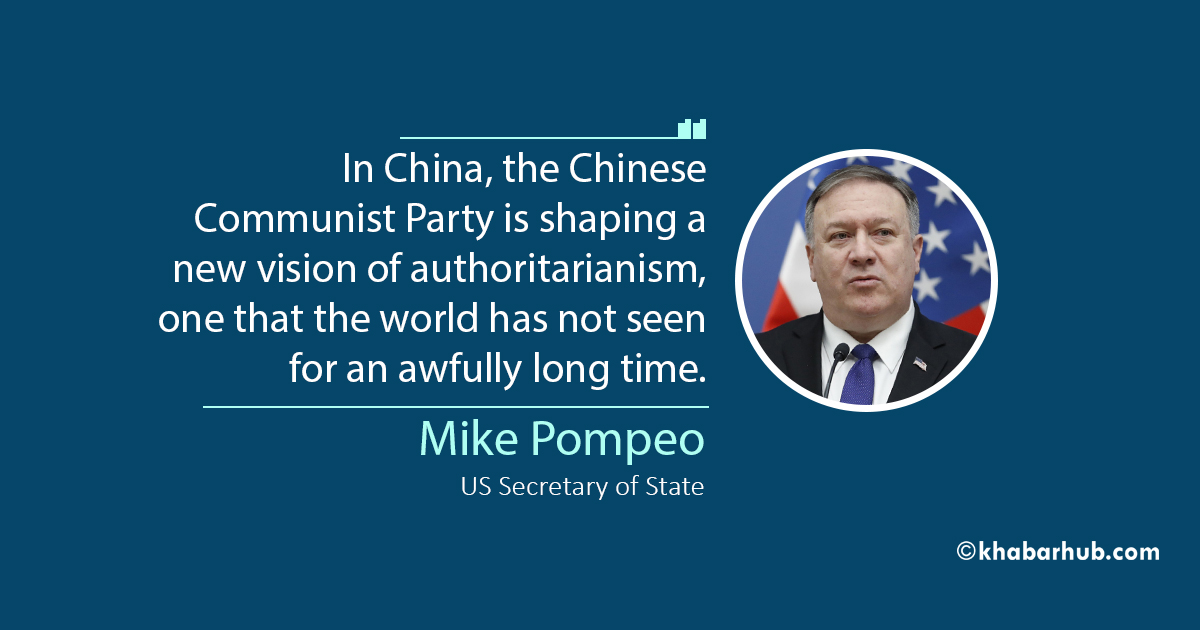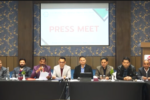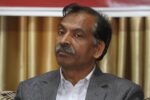As many of you know, I am from the great state of Kansas. It’s right smack dab in the center of the United States of America. And we have been welcoming Germans, German immigrants, since the 1800s.
They founded towns that I know people in and have campaigned in, towns like Bremen, a little town called Humboldt, Stuttgart – you know. It’s Germans like those people that I know so well from Kansas who helped build America.
But my personal connection to your great country, and to the German people, began in the fall of 1986, as a younger, thinner, more daring Army second lieutenant, in a place called Bindlach – we’re not far from, by the way. I am one of the millions of Americans who have lived in Germany since the founding of the Federal Republic back in 1949.
My tour, my time on station here, happened towards the end of the Cold War, but my fellow soldiers and I know that we had no idea that it was, in fact, close to the end. We did midnight emergency drills and exercises within sight of a militarized border.
But we knew we had the ultimate advantage. We had national leaders with a deep faith in God, and human dignity, that had confidence in free peoples, with the courage of their convictions, who also had patience and persistence.
Would the next patrol – I patrolled the border from the tri-zonal point in Czechoslovakia then, Czechoslovakia up and through Hof and through Modlareuth.
Would the next patrol be our last? This was very real. It seems hard to imagine for the young people in either of our two countries. We didn’t know.
But we knew we had the ultimate advantage. We had national leaders with a deep faith in God, and human dignity, that had confidence in free peoples, with the courage of their convictions, who also had patience and persistence.
They built our peoples’ resolve. They made the case to their respective peoples. They built our institutions and alliances so that we could collectively prevail over communism and over evil.
And behind the Iron Curtain, a brave and noble group of East German citizens refused to remain chained inside a communist system that denied the inherent worth of every individual. Indeed, they are the real heroes of this story. I had a chance to meet with a few of them last night in Leipzig.
Together, we won the Cold War: Germany, Germany and the United States, and all of our Allies and partners. And so it’s why I am really thrilled and happy to be here. It’s why I’m so proud – speaking mere feet from where the Wall once stood – to celebrate its demise now three decades ago.
Sometimes we need to take a victory lap. We get caught up in the challenge of the day and we forget the greatness that we have achieved to lift billions of people out of horrific conditions, and that we did so together.
But as we celebrate, as we take this victory lap, we must also recognize that freedom is never guaranteed. We spoke to this. It doesn’t just happen. Today, authoritarianism is just a stone’s throw away. It’s rising. And if we’re honest, it never really went away completely.
President Reagan thought that communism was a “disease” and he called it an “insanity.” How right he was. We should never forget how many millions of people suffered and died from the communist cause in the 20th century.
And I see there’s members of the Bundestag here, business leaders here in Germany. It’s up to us, all of us. It’s up to us to secure our freedom and our future together, and that is the subject of what I want to talk about today, how the United States and Germany can do this together, must do this together, for the good of our peoples and for the good of the world.
Now, I know, too, that many of you in the audience today – no matter what side of the Wall you grew up on ‒ won’t forget the horrors of the German Democratic Republic.
In 1961, the Vopos first jackhammered this city’s pavement and laid the cornerstones of cruelty.
Those stones became 27 miles of the wall snaking through the German capital, dividing a people. The Wall wasn’t there to keep the West out. It was there to keep the East German people in. That’s how authoritarian regimes operate then. It’s how they operate today.
They force people against their own will to not have the capacity to sustain themselves and be dependent on that regime.
President Reagan thought that communism was a “disease” and he called it an “insanity.” How right he was. We should never forget how many millions of people suffered and died from the communist cause in the 20th century.
Indeed, the bleakness of East Germany was clear to me too, when I was stationed here. I could see it, although only from a distance, and only a short distance across that border.
But I knew – I was young, I was in my early 20s – but what kind of country needed bricks and barbed wire and machine guns just to keep its people from fleeing, and they needed a Stasi to keep people from talking? Yesterday, I had a chance to go revisit some of the same ground I walked when I was in my early 20s.
I saw the tools of terror from the perspective of the other side. I’d never been across that piece of terrain before. I’d seen Modlareuth, but only from one side. Yesterday, I got to see it from the other side.
And yet for all of that, for all of that governmental power, all of that authoritarianism, the GDR couldn’t crush the human spirit. The Germans maintained their imperishable hope of freedom and a better future even under that authoritarian regime.
Countless East Germans – so many of them Berliners, and maybe some of them related to you that are sitting right here today – made the daring flight against the – across the “kill zone” and the Wall. And a number of them, of course, died trying. Our Embassy here in Berlin, where the American flag flies proudly today, sits on the land that was once in that “kill zone.”
But East Germans knew they weren’t alone. They knew they had a partner.
And they took heart from the soaring words of leaders and deeds of Presidents Truman and Kennedy and Reagan.
They remembered the East German uprising of 1953, and the Hungarian uprising just a few years later in 1956, and the Prague Spring of 1968.
And they saw. They saw kindred spirits all across the world. They saw them in Poland, the march for Solidarity.
They felt the prayers of Pope John Paul II.
And they saw the courage to be free in the student protests in Tiananmen Square.
And at their back – at their back – was all of us. It was the wind of Western resolve and power.
That mission wasn’t always easy. It seems as we think about the challenges between allied partners today, the kerfuffles that make all the news, we think it was the Halcyon times. There were challenges then, too. I could recount them.
NATO suffered France’s departure from its integrated military command in the 1960s. And the United States tried detente with the Soviets, without success, later than that.
Chancellor Kohl weathered political opposition – enormous political opposition and protests when he deployed U.S. nuclear missiles in Germany in an attempt to deter Soviet aggression.
We shouldn’t forget that Mitterand and Thatcher didn’t support reunification at first. It’s not historic for nations to have differences in judgment at times.
But as Reagan said, two things were absolutely non-negotiable: our collective freedom and our collective future.
We knew that deep down, deep down, a system that was afraid of its own people could never be sustained. I believe that wholeheartedly today.
We thought perhaps that the collapse of communism in Berlin and Moscow and the rest of the Eastern Bloc was the start of an inevitable trend worldwide. There were those who wrote about the “end of history.”
We just didn’t – thank you. We just didn’t know when it would end. Neither the lieutenant in the field nor the president of the United States nor the chancellor of Germany knew the moment that it would come, but we knew it was absolutely imperative that we fight for it. And I think there is a real lesson there.
There’s a lesson there for those of us who think that authoritarian regimes are destined to live forever. They are not.
In 1989, on the day before George H.W. Bush’s inauguration, Erich Honecker predicted the Wall would stand in, quote, “fifty and even one hundred years,” end of quote. I had just left.
I left at the beginning of October of 1989 to return to my next duty assignment. I had no idea that I left just a couple of weeks early. German courage – German courage brought it down 294 days later. It’s made my visit to St. Nicholas Church last night in Leipzig particularly poignant for me.
The German triumph inspired others to throw off the chains of the Soviet empire, too, and secure their own freedom, their own future, their own dignity.
So here we are on this three-decade anniversary celebrating a monumental victory for mankind’s natural longing for freedom, for this great city of Berlin, for Germany, for the German people, but also for the West ‒ all of us.
All of us had a moment after those days where we lost our way in the afterglow of that proud moment.
We thought perhaps that the collapse of communism in Berlin and Moscow and the rest of the Eastern Bloc was the start of an inevitable trend worldwide. There were those who wrote about the “end of history.”
We thought free societies would flourish everywhere. And in some places, they indeed have. But we, most importantly, thought that we could divert our resources away from alliances and militaries and the things that had secured those very freedoms.
Sadly, we were wrong. We were wrong about the human condition and the nature of the course that many countries might take today.
Today, Russia – led by a former KGB officer stationed in Dresden ‒ invades its neighbors and slays political opponents. It suppresses the independence of the Orthodox Church in Ukraine.
Russian authorities, even as we speak, use police raids and torture against Crimean Tatars and Ukrainians who are working in opposition to Russian aggression. In Chechnya, anyone considered “undesirable” by the authorities simply disappears.
And we must recognize who we are. Our two democracies, the United States and Germany, possess the abundant political and economic capital and the power that can only be garnered by free societies.
In China – in China, the Chinese Communist Party is shaping a new vision of authoritarianism, one that the world has not seen for an awfully long time. The Chinese Communist Party uses tactics and methods to suppress its own people that would be horrifyingly familiar to former East Germans.
The People’s Liberation Army encroaches on the sovereignty of its Chinese neighbors, and the Chinese Communist Party denies travel privileges to critics – even German lawmakers – who condemn its abysmal human rights record.
The CCP harasses the families of Chinese Muslims in Xinjiang, who simply sought refuge abroad. We – all of us, everyone in this room – have a duty. We must recognize that free nations are in a competition of values with those unfree nations.
The truth – this truth – wasn’t quite apparent to us in 1989. That’s understandable, perhaps.
So today, today 30 years on, we must mix celebration with sobriety. We must see the world for what it truly is.
And we must recognize who we are. Our two democracies, the United States and Germany, possess the abundant political and economic capital and the power that can only be garnered by free societies.
We have a duty – each of us – to use all we have to defend what was so hard-won in 1776, in 1945, and in 1989.
And we have to do it together. We have to do it together because it’s not easy, and doing it alone is impossible. It’s never easy. It never is and it never will be.
This is why we make a tough case about ensuring that Germany doesn’t become dependent on Russian energy. We don’t want Europe’s energy supplies to be dependent on Vladimir Putin.
It’s why we ask for more from all of our NATO Allies, because Western, free nations have a responsibility to deter threats to our people, and that we are only stronger together.
It’s why President Trump asks every nation to help pressure the revolutionary regime in Tehran to get back to the negotiating table and get Iran to do this simple thing – to behave like a normal nation and not conduct assassination campaigns right here in the heart of Europe.
And it’s why I spend a fair amount of my time talking about the risks that are presented to the world by the Chinese Communist Party, its acquisition of sensitive technology firms and Chinese companies’ intent to build out the world’s next networks.
Your own intelligence chief said that Huawei cannot be fully trusted, because it is subject to the power of the Chinese Communist Party.
It’s why we must speak up when we see human rights abuses inside of China, in Burma, in Iran and elsewhere, because if you don’t lead, if America doesn’t lead, who will?
Today, my fellow Americans and I rejoice with the German people. The Wall is no more.
But let us also not take lightly the threats to our freedoms, the challenges that we all face from regimes, regimes that rule instead of govern, regimes that crush rights instead of protect them, regimes for which this anniversary is a fearful warning, not a cause for celebration.
Those of us who want to spread freedom must confront those that want to spread their vile ideology, to dominate free nations of the world, and to subvert the rule of law, and to undermine the multilateral institutions that matter so much to freedom. They want to turn them to their own political ends.
We have to collectively move forward, look forward, and face this threat with our eyes wide open if we are to overcome it. I know that we will. It’s our duty to decide the terms on which our people will live, and we want them to live in peace and in freedom.
So let’s resolve today – all of us, those of us in government, those of us in business – let us stand together in unity.
Let us stand together as allies.
Let us stand together as dear friends, as we have always been.
We’ve done it before. I am very, very confident that we will continue to do it, and do it again and again.
I hope God will bless each of you, God will bless this great country Germany and our close friendship together. Thank you all so much.
(Remarks by Mike Pompeo at Koerber Stiftung Axica in Germany)









Comment